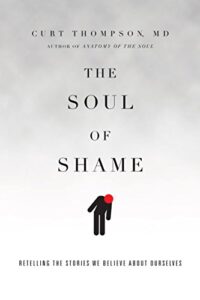A Take-Holmes Assignment
What’s Jasmine Holmes reading?
On shame:

The Soul of Shame: Retelling the Stories We Believe About Ourselves
By Curt Thompson, MD
(InterVarsity Press, 2015)
From Jasmine: “A huge help in my understanding of how shame actually rewires the brain, from the perspective of a professional in the field of mental health.”
From the Reading Everybody Black Challenge 2023:

The Davenports
By Krystal Marquis
(Dial Books, 2023)
 The House of Eve
The House of Eve
by Sadeqa Johnson
(Simon and Schuster, 2023)
Up next:
 Half American: The Epic Story of African Americans Fighting World War II at Home and Abroad
Half American: The Epic Story of African Americans Fighting World War II at Home and Abroad
By Matthew F. Delmont
(Viking, 2022)
Yes, shame keeps us all in check. Shame isn’t something that we completely want to do away with as a society, because like a thermometer, shame takes our temperature and can tell us when something is off. But shame is a sub-par stand-in for the Holy Spirit.
We can feel shame over sin. We can feel shame over bad things that we’ve done. But the shame I’m talking about here is the shame that we feel when shame masks itself as conviction.
Shame Isn’t (Always) Reality
Two years ago, I put my son into a private school and I was racked with shame. I was homeschooled, and I was raised in an environment where even our church’s private school would have been a less than ideal place to send my child. The “ideal” would have been that he would be at home, that we would be together at the kitchen table, that I would be discipling him 24/7.
This feeling of shame came from my specific environment, a certain subculture, certain types of people that I had been raised around and with whom I had relationships. It’s important to note that I didn’t feel guilt, because guilt is something that comes with sin. Sending my son to private school is not sin. And because there wasn’t sin at play, the shame I felt was not conviction. It was an alternate reality.
Shame takes us away from reality. It can take us so far that sometimes the truth almost seems like a lie. And shame also makes it difficult to come back to reality, keeping us in isolation and keeping us from even asking for the truth. I always think about the moment that Adam and Eve decided to run away from the God with whom they had walked every single day.
Reality Isn’t (Always) Final
Our first parents had no reason to believe God wouldn’t be good, that he wouldn’t try to rescue them. Up to that point, their only experience of God had been benevolence in love. They could have responded by running to God, saying, “I’ve made a mistake, but in all of my experiences, you have been good. How can what has been done wrong be made right?” Yet how did they respond? By hiding in shame behind fig leaves, trying to handle the situation themselves. This is how shame manifests itself so often in our lives now — though the fig leaves that we put on to try to hide behind may look different.
Blessedly, right there in the garden, in Genesis 3:15, God tells Adam and Eve that there will be a way out of the sin and the shame. Christ took care of shame on the cross, and we live in that already-but-not-yet space in which creation is groaning for him to come again. One of creation’s groans, I think, is the feeling of shame.
Like Adam and Eve, I have tried to hide behind my own fig leaves. When I was dating my husband, I tried to be the perfect girlfriend. I wanted him to think that I was worthy of his love and worthy of being picked by him. I remember finally seeing, “There is a way that you can be loved without this pretense. There is a way that somebody can care for you anyway.” My whole life up to that point was fig leaves. Still, nine years in, it helps to hear him saying, “You’re not performing for me. It’s not about satisfying or appeasing me. What you do is unto the Lord, and so I trust you.”
Truth Is (Always) Better
A practical way to stay grounded in reality is by seeking the Lord and his people. It makes such a difference to demonstrate that someone won’t be cast out of the community if he shows imperfection. Not to be people who say, “You’ll never do anything wrong. You should always feel amazing about everything you’re doing” — because I shouldn’t always feel amazing about everything that I’m doing — but being people who will point to the fact that unhealthy shame died on Christ’s cross.
Shame often comes from looking at ourselves through another’s eyes, and the truth is a much better alternative. Shame won’t be completely eradicated yet, but it can be put in its proper place. Shame is loud. But the truth will set us free.
As told to Sarah Haywood. Edited for clarity and style.

This story is from Common Good issue 11.